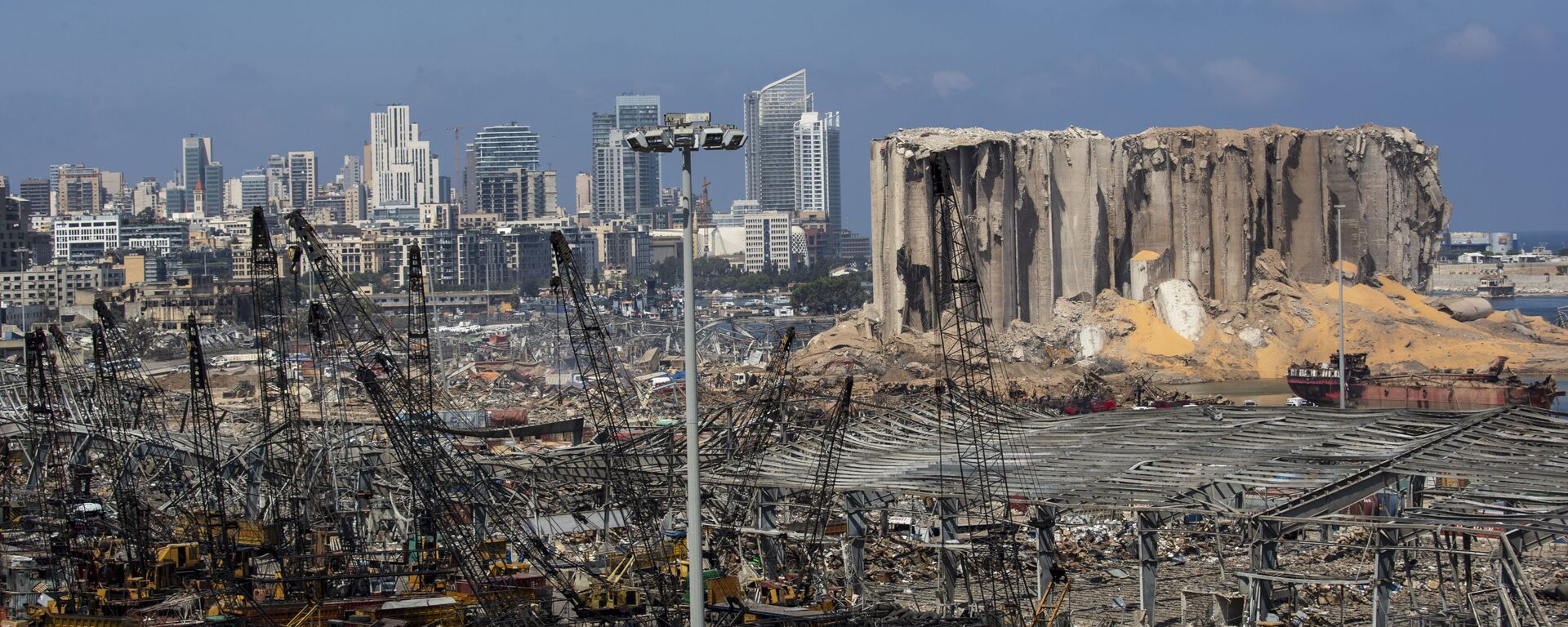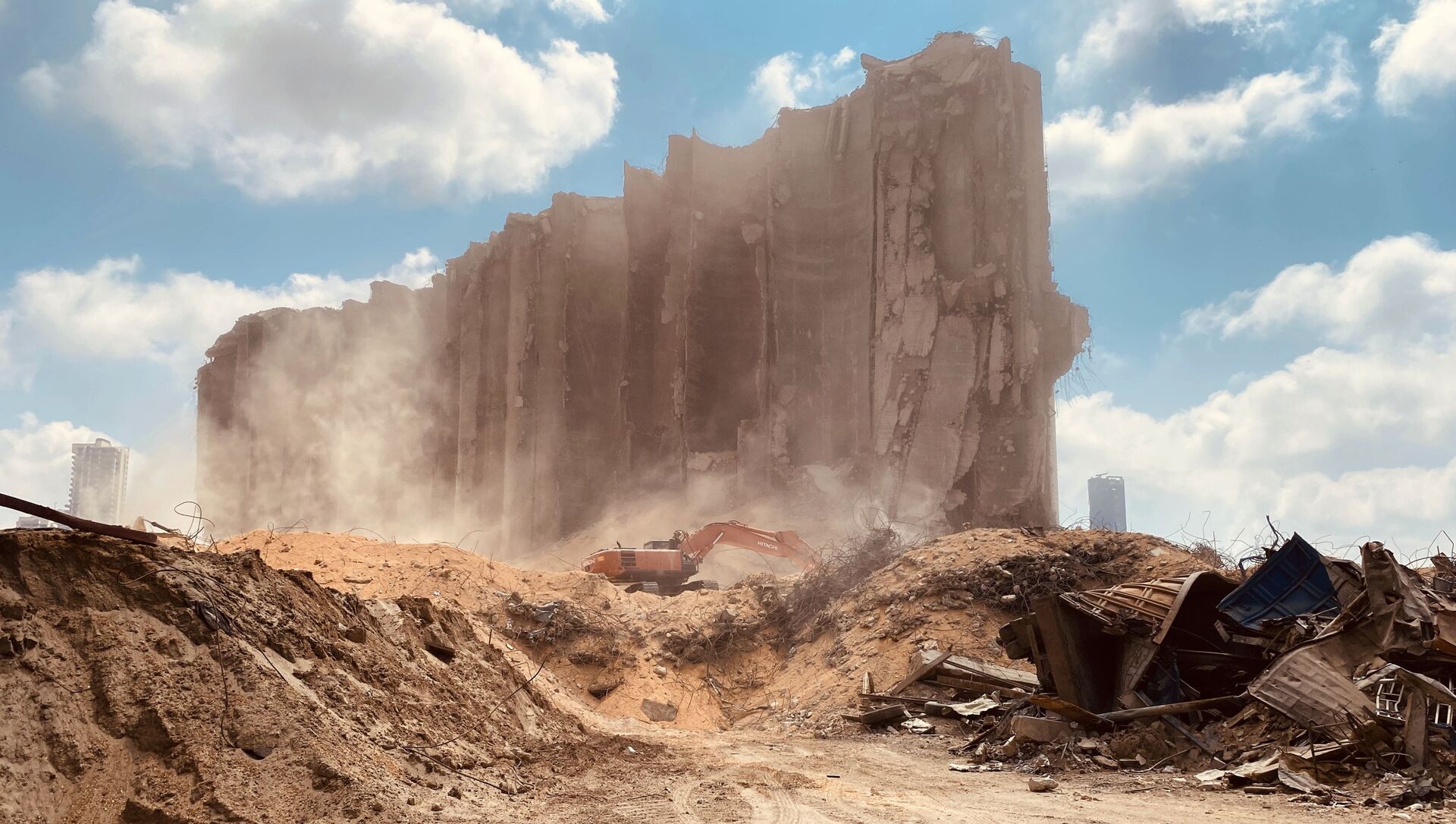https://sputnikglobe.com/20210804/a-year-after-beirut-explosion-eyewitness-hopes-for-justice-and-says-truth-will-prevail-1083521574.html
A Year After Beirut Explosion, Eyewitness Hopes For Justice and Says Truth Will Prevail
A Year After Beirut Explosion, Eyewitness Hopes For Justice and Says Truth Will Prevail
Sputnik International
A Beirut-based journalist, who was injured during the explosion, considers Lebanese politicians responsible for the current mess. But he also blames the army... 04.08.2021, Sputnik International
2021-08-04T08:03+0000
2021-08-04T08:03+0000
2021-08-06T04:24+0000
middle east
world
newsfeed
beirut
explosion
lebanon
https://cdn1.img.sputnikglobe.com/img/07e4/08/16/1080245518_0:71:2887:1704_1920x0_80_0_0_7a4c56828e571b522dbf436cab3ca795.jpg
It's been a year since a huge explosion shook the Lebanese capital of Beirut, killing more than 200 people and injuring 7,000 others.The blast was considered one of the most devastating non-nuclear explosions in history, displacing 300,000 people and causing some $4.6 billion in physical damage, leaving residential buildings, schools, hospitals and infrastructure partially or fully destroyed. Haunting PastKhalil Harb, a Beirut-based journalist, says he remembers that hot summer day last August that split his life into 'before' and 'after'.On 4 August 2020 he was sitting at his office, a newspaper building in downtown of Beirut, where he was supervising the launch of a new Arabic-language website.Harb says that the shockwave threw him back. He received multiple injuries and lost much blood but he was lucky to remain alive. "I remember I was lying on my stomach thinking that I had died or was about to. I saw a woman lying next to me. I don't know whether she survived but I did."An investigation into the deadly explosion is currently underway. It has already revealed what triggered the blasts. According to estimates, the Beirut port, considered one of the most important ones in the Middle East, stored fireworks that were ignited.The second blast, which was even larger than the previous one, may have been caused by the fire reaching 2,750 tonnes of ammonium nitrate that had been kept there for years.But Harb suspects the probe does not reveal all the truth. "I am sure that before the explosion took place, there was the sound of a military jet flying around. I remember that when the blast occurred I shouted it was an airstrike. My colleagues thought so too, and one of them even said 'they bombed us'."Harb doesn't know, who could have wanted to bomb the port but he doesn't rule out that it could be an outside element such as Israel.Israel has denied all related allegations. Lebanese officials, including representatives of Hezbollah, a Shiite militia and political party which Israel considers one of its biggest foes in the region, have also indicated that it was unlikely that Tel Aviv was behind the explosion.Demanding AnswersMeanwhile, thousands of affected families are still waiting for answers. The government, however, is struggling to provide them with data. It remains unable to bring those responsible for the tragedy to justice.According to an Amnesty International report, many Lebanese officials, believed to be linked to the blast, have relied upon their political immunity. The organisation also suggested that the authorities hampered the course of the investigation and that they dismissed a number of judges appointed to the probe after they summoned political figures for questioning.However, Harb says it is not only Lebanon’s politicians who need to be held accountable. "Our army has a direct responsibility to handle any explosive materials in the country and making sure that the residents are safe. And, of course, it is also the judiciary system. They have been aware of the hazardous cargo for years but they chose to turn a blind eye to the issue."During the past year, the Lebanese people have been demanding justice, staging rallies across the country. Harb chose not to take part in any of these protests, saying he didn't want his "blood to be exploited". Nor does he want to comment on the ongoing investigation, but looking at the pace and the lack of progress made, he says there is little room for encouragement.
https://sputnikglobe.com/20201205/360-panorama-shows-aftermath-of-deadly-port-blast-in-beirut-1081369865.html
beirut
lebanon
Sputnik International
feedback@sputniknews.com
+74956456601
MIA „Rosiya Segodnya“
2021
News
en_EN
Sputnik International
feedback@sputniknews.com
+74956456601
MIA „Rosiya Segodnya“
Sputnik International
feedback@sputniknews.com
+74956456601
MIA „Rosiya Segodnya“
middle east, newsfeed, beirut, explosion, lebanon
middle east, newsfeed, beirut, explosion, lebanon
A Year After Beirut Explosion, Eyewitness Hopes For Justice and Says Truth Will Prevail
08:03 GMT 04.08.2021 (Updated: 04:24 GMT 06.08.2021) A Beirut-based journalist, who was injured during the explosion, considers Lebanese politicians responsible for the current mess. But he also blames the army and the judiciary, who knew about the stocks of ammonium nitrate but failed to protect the capital.
It's been a year since a huge explosion shook the Lebanese capital of Beirut, killing more than 200 people and injuring 7,000 others.
The blast was considered one of the most devastating non-nuclear explosions in history, displacing 300,000 people and causing some $4.6 billion in physical damage, leaving residential buildings, schools, hospitals and
infrastructure partially or
fully destroyed.
Khalil Harb, a Beirut-based journalist, says he remembers that hot summer day last August that split his life into 'before' and 'after'.
On 4 August 2020 he was sitting at his office, a newspaper building in downtown of Beirut, where he was supervising the launch of a new Arabic-language website.
Then the blast occurred. "I looked out the huge glass windows to try and understand what could have caused this explosion. My colleagues and I ran into a small office overlooking the explosion site. I took out my phone to take pictures and then a huge blast went off."
Harb says that the shockwave threw him back. He received multiple injuries and lost much blood but he was lucky to remain alive. "I remember I was lying on my stomach thinking that I had died or was about to. I saw a woman lying next to me. I don't know whether she survived but I did."

5 December 2020, 15:17 GMT
An investigation into the deadly explosion is currently underway. It has already revealed what triggered the blasts. According to estimates, the Beirut port, considered one of the most important ones in the Middle East, stored fireworks
that were ignited.
The second blast, which was even larger than the previous one, may have been caused by the fire reaching 2,750 tonnes of ammonium nitrate that had been kept there for years.
But Harb suspects the probe does not reveal all the truth. "I am sure that before the explosion took place, there was the sound of a military jet flying around. I remember that when the blast occurred I shouted it was an airstrike. My colleagues thought so too, and one of them even said 'they bombed us'."
Harb doesn't know, who could have wanted to bomb the port but he doesn't rule out that it could be an outside element such as Israel.
Israel has denied all related allegations. Lebanese officials, including representatives of Hezbollah, a Shiite militia and political party which Israel considers one of its biggest foes in the region, have also indicated that it was unlikely that Tel Aviv was
behind the explosion.
Meanwhile, thousands of affected families are still waiting for answers. The government, however, is struggling to provide them with data. It remains unable to bring those responsible for the tragedy to justice.
According to an Amnesty International report, many Lebanese officials, believed to be linked to the blast, have relied upon their political immunity.
The organisation also suggested that the authorities hampered the course of the investigation and that they dismissed a number of judges appointed to the probe after they summoned political
figures for questioning.
However, Harb says it is not only Lebanon’s politicians who need to be held accountable. "Our army has a direct responsibility to handle any explosive materials in the country and making sure that the residents are safe. And, of course, it is also the judiciary system. They have been aware of the hazardous cargo for years but they chose to turn a blind eye to the issue."
During the past year, the Lebanese people have been demanding justice, staging rallies across the country. Harb chose not to take part in any of these protests, saying he didn't want his "blood to be exploited".
Nor does he want to comment on the ongoing investigation, but looking at the pace and the lack of progress made, he says there is little room for encouragement.
"[Whatever the investigation reveals] is not going to convince me. But justice will prevail one way or the other."





